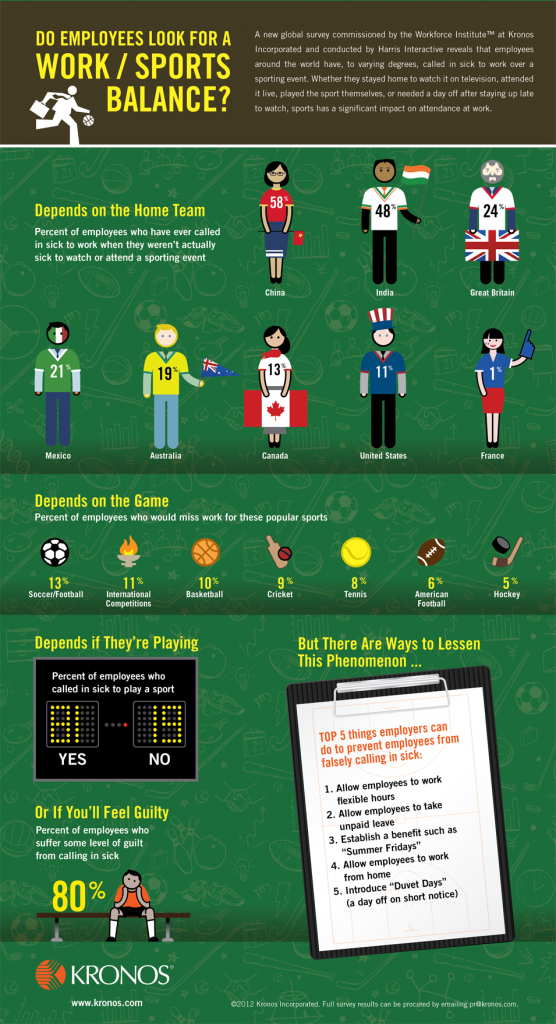Over the years, I’ve had employees call in sick for all sorts of reasons and I’m sure that at least some of the time, they weren’t completely truthful about a) the reason they were ill; or b) that they were really sick at all.
Yes, even in our modern world with flexible work schedules and PTO banks, employees sometimes call in sick when they really aren’t sick and have something else going on instead.
That’s why this new global study conducted by Harris Associates for The Workforce Institute at Kronos Incorporated doesn’t come as a huge surprise: it found that “employees around the world have, to varying degrees, called in sick to work over a sporting event.”
How sporting events caused “illness”
The Kronos “Sidelined by Sports” survey talked to workers in Australia, Canada, China, France, India, Mexico, the United Kingdom, and the U.S.A. Here’s the highlights of what they found:
- Significant numbers of employees around the world admit to calling in sick to work so they could stay home and watch or attend a sporting event. China led all surveyed regions with 58 percent, while in France only one (1) percent answered yes. Other countries polled included India with 48 percent, the U.K. with 24 percent, Mexico with 21 percent, Australia with 19 percent, Canada with 13 percent, and the U.S. with 11 percent.
- High numbers of respondents also said that they had called in sick the day after a sporting event because they were up late watching/attending it: 54 percent in China, 41 percent in India, 23 percent in the U.K., 19 percent in Australia, 16 percent in Mexico, nine percent in Canada, seven percent in the U.S., and one percent in France.
- When it came to calling in sick to play a sport themselves, China was again at the top with 49 percent, followed by India with 38 percent, Mexico with 18 percent, the U.K. with 16 percent, Australia with 10 percent, Canada with seven percent, the U.S. with five percent, and France with zero.
- Which sports were most likely to cause employees to miss work? In Australia, France, Mexico, and the U.K., football (referred to as soccer in the U.S.) took the top spot. In the U.S., it was (no surprise) American football, China was basketball, Canada was (again no surprise) hockey, and India was cricket.
- Employees actually said they felt pretty guilty about calling in sick to watch or play sports. The numbers of people who responded that they felt “at least somewhat guilty” were 92 percent in France, 90 percent in China, 85 percent in Mexico, 78 percent in India, 74 percent in Australia, 71 percent in the U.S., 64 percent in Canada, and 63 percent in the U.K.
- When it came to what employers could do to prevent employees from calling in sick when they are not actually sick, the top answer in every region was to allow employees to work flexible hours – this tied for first place with allowing employees to work from home in India. Allowing employees to take unpaid leave and establishing a benefit like summer Fridays were the other options chosen most frequently in every region.
Unscheduled absences cost 8.7% of payroll
Kronos also noted that unscheduled absences – such as when an employee calls in sick at the last minute – cost organizations 8.7 percent of payroll each year, as they found in a recent Kronos survey conducted by Mercer. That alone should give organizations that don’t offer flexible schedules a good reason to re-evaluate their thinking.
“Unscheduled absences cost organizations 8.7 percent of payroll each year – that’s a significant dollar figure,” said Joyce Maroney, director of The Workforce Institute at Kronos in a press release. “This survey indicates that sporting events of all kinds can be a trigger for unscheduled absences. Managers would do well to speak with employees when they know there is a big sporting event coming up to try to determine who is likely to be out. Planned absences cost organizations less because alternatives can be put in place at a less-than-premium price.”
The “Sidelined by Sports” survey was conducted online within the U.S. by Harris Interactive on behalf of Kronos from April 10-12, 2012 among 2,145 adults ages 18 and older, of whom 1,189 are employed full/part time. This online survey is not based on a probability sample and therefore no estimate of theoretical sampling error can be calculated.
Globally, the study was conducted online by Harris Interactive on behalf of Kronos among a total of 7,302 adults aged 16-64 (5,793 of whom are employed full/part time) within Australia, Canada, China, France, Great Britain, India, and Mexico from April 11-17, 2012 via its Global Omnibus product. Figures for age, sex, education, region, income, and Internet usage were weighted where necessary to bring them into line with their actual proportions in the population.
Employees shouldn’t be forced to fib or lie to get time off, for whatever reason. If your workforce policies are driving workers to have to call in “sick” to watch a game or do something else, well, you need to take a good, long look at those policies and do something to fix them before your people decide to simply go find another place to work that is a little more forward thinking.

